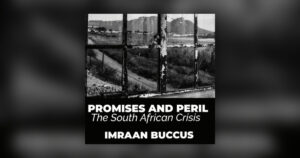
Democracy will not survive in its current form with such extreme rates of unemployment. It will either be rolled back or deepened.
By Imraan Buccus
As New Frame observed in a recent searing editorial, unemployment in South Africa at 42.3% is less than a percentage point lower than the rate of unemployment in Gaza. And youth unemployment at 74.7% is the worst rate recorded anywhere in the world. These are mind-blowing statistics.
Moeletsi Mbeki wrote after the Arab Spring in 2011 that South Africa’s “Tunisia Day”, the day on which “the masses rise against the powers that be”, would arrive in “2020, give or take a couple of years”. Noting that life expectancy had declined under ANC rule and that the country had, for the first time, become a net importer of food, he famously stated that “the ANC inherited a flawed, complex society it barely understood; its tinkerings with it are turning it into an explosive cocktail. The ANC leaders are like a group of children playing with a hand grenade.”
At that time, many thought that this language was over the top. But analysis has to start from the realisation that there is no historical record of any society with the scale of youth unemployment that we currently have surviving as a liberal democracy. Youth unemployment, which was considered extremely high at 23.4%, is understood to have been a key factor driving the youth rebellion that resulted in the Arab Spring. The other two factors are understood to have been a deep disgust at endemic corruption and rage at the police’s constant harassment of unemployed young people.
All three of these factors are present in South Africa. There can be no doubt that in a country in which three out of four young people are without work, brazen corruption is endemic and the police and army could repeatedly murder people during the initial Covid-19 lockdown, leaders have utterly failed.
ANC ‘on steroids’
In most democracies, a party with a record in office as abysmal as that of the ANC would have been voted out long ago. But the national liberation movements that came to power at independence remain in power across southern Africa. There is an added dimension in South Africa in that elections have, for most people, long been little more than a choice between the deeply flawed party of African nationalism and the party of largely white liberalism, a party that is now rapidly self-destructing as it moves further to the Right.
The dramatic entrance of the EFF into the electoral space has given some an alternative to the ANC. But despite huge media attention way out of proportion to the scale of its support, most South Africans have not been persuaded that the EFF is a viable alternative. The party appears just as corrupt and much more authoritarian than the ANC. Some have said the EFF is the ANC “on steroids”.
Voters who are disillusioned with the ANC tend to stay away from the polls rather than vote for opposition parties. And the factional battles within the ANC lead others to vote for the ANC again in the hope that the ascendancy of a new faction will bring a new dawn.
But the ANC will not survive like this forever. There are three broad possibilities that arise.
One is that as shutdown-type protests such as those we saw recently in Bloemfontein appear in more cities and towns, the ruling party responds with increasing authoritarianism.
Governments have often fallen when millions take to the streets to demand the end of a regime. But this only happens when the police and army refuse to shoot at them. We know from the Marikana massacre and assassinations of grassroots activists that the ANC is already engaging in formal and informal forms of violence to repress popular dissent.
This could escalate as protests escalate and end up in one or more massacres. It could also be accompanied by something like a state of emergency. In this scenario, the ANC would end up much like Zanu-PF in Zimbabwe, and South Africa would end up much like Zimbabwe, with a brutal state holding on to power despite the worsening suffering of its people.
A popular turn
Two is that a charismatic figure emerges, an authoritarian strongman or woman who promises to “clean up” society. History shows that in times of social crisis, and a general collapse of confidence in established forms of politics, there is often a popular turn to authoritarianism. In many postcolonial societies, such figures claiming to be able to restore the integrity of society have emerged from the military and taken power in coups. This scenario seems highly unlikely in South Africa, as the military is not a widely respected institution with a strong presence in public life.
However, as we know from the experience in countries such as the United States, India and Brazil, authoritarian populism aiming to roll back democracy, scapegoat minorities for social crises and ally with elites to generate new forms of accumulation can also emerge via the electoral system. In India, there is a long tradition of well-organised fascism. Narendra Modi and his anti-Muslim politics did not come from nowhere. But in the US and Brazil, Donald Trump and Jair Bolsonaro emerged as if from nowhere, in a sort of blitzkrieg, to quickly take power.
We already have two authoritarian populists positioning themselves to rise to power on the back of the crisis: Julius Malema and Herman Mashaba. Malema presents himself as a radical nationalist while Mashaba presents himself as a hard right-wing personality. But both men are scornful of liberal democracy and try to scapegoat minorities for the current crisis. Malema takes an anti-Indian position that, in some of his comments, echoes the lies that European fascism told about Jews. Mashaba targets migrants in a manner much like Trump.
It seems probable that the ongoing exposés about corruption among EFF leaders will seriously damage the party’s already limited credibility. The radical economic transformation faction of the ANC has not won any real popular support. And few South Africans see stealing from impoverished people to make the rich richer as a popular programme. There is a deep disgust at the likes of Jacob Zuma and Ace Magashule, a disgust that may well come to include Malema, Floyd Shivambu, etc. Mashaba is not a serious contender for the obvious reason that he has no charisma.
But we could, as happened in the US and Brazil, experience the sudden rise to power of a new personality, a charismatic authoritarian promising to “drain the swamp”, expel migrants, castrate rapists, reinstate the death penalty and so on. This could all be expressed through the language of religion, although that would not be necessary. Our democracy would not survive this.
Not a utopian idea
Three is the only possibility that would allow our democracy to survive. This would require the democratic organising of a significant portion of the unemployed with the aim of building an inclusive and just society. This organising would have to reach the sort of scale that would give it the power to push the existing parties to the Left and force them to deal with corruption, or support a new progressive party to take power.
This is not a utopian idea. The governments that came to power in Latin America during the Pink Tide in countries such as Brazil and Bolivia were rooted in mass organisation and won huge gains for their people. The victory of Pedro Castillo, a socialist, in the recent election in Peru shows that the Latin American Left is still a powerful force.
In South Africa, shack dwellers’ movement Abahlali baseMjondolo, which now has an audited membership of more than 100 000 members across five provinces, shows that it is possible for impoverished people to be effectively organised. A significant majority of its leaders are women and the movement has kept its democratic character despite severe and continuing repression.
However, despite its steady national growth, the movement is a powerful force only in Durban. Imagine if there were movements with similar power in cities and towns across the country, and if they linked to drive a progressive project at the national level. This would deepen our democracy, oppose corruption and push for more public participation in policy making and more effective implementation. This is the high road out of the current crisis and to a just and democratic future.
But analysis only takes us so far. As Karl Marx famously said, “The philosophers have only interpreted the world in various ways; the point, however, is to change it.”
This article appeared originally in “New Frame.”






